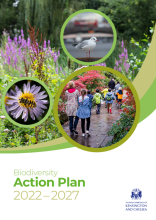Biodiversity in Kensington and Chelsea

Kensington and Chelsea is one of the most densely populated London Boroughs with only 19% of the Borough designated as open space, giving the least amount of open space per head. Despite this, we have a surprisingly rich biodiversity resource and are home to many nationally and internationally scarce species and a variety of important habitats.
Biodiversity is part of our heritage and provides a healthy environment for us to live and work. The intrinsic benefits provided by biodiversity impact our everyday lives, from contributing to clean air through our trees, green spaces absorb rainfall preventing flooding, helping our environment be resilient to a changing climate, to bees and insects pollinating our crops to name a few.
Kensington and Chelsea Local Sites
There are 24 designated Sites of Importance for Nature Conservation (SINCs) in the borough, including woodlands, parks, and wildlife gardens. These are sites that have been designated as they are either important areas of wildlife habitat, places where rare species are found, or places whereby the local community can have contact with the natural world.
There are different types of Local Sites in the Borough:
- Sites of Metropolitan Importance – Containing the best examples of London's habitats and species and opportunities to have contact with nature
- Sites of Borough Importance grade I and II - These sites have a significant contribution to the ecology of the Borough and damage to these sites means a significant loss to the Royal Borough.
- Sites of Local Importance - These sites are of value to people, nearby residents, and schools. These sites are designated in recognition of their role to the community and nature locally.
All sites are a priority for protection and provide opportunities for people to have contact with the natural environment.
For information about parks and open spaces in the borough visit our pages about parks in the borough.
Biodiversity Action Plan
The Council’s Green Plan has five environmental priorities, of which one is ‘Protecting and enhancing biodiversity’. The new Biodiversity Action Plan 2022–2027 (BAP) has been produced to deliver this priority. The BAP sets out how we will protect, restore and enhance biodiversity for the next five years, helping to secure the borough’s natural environment and green infrastructure for future generations.
The BAP covers priorities at local, regional and national levels and turns them into actions. The BAP will contribute towards the Council Plan and other strategic ambitions, including those set out in the revised Local Plan, revised Air Quality and Climate Emergency Action Plans, and the challenges identified by the climate emergency. It also covers how the Council will meet its statutory duties with regard to wildlife set out in the Natural Environment and Rural Communities Act 2006 (NERC) and incorporates new legislative requirements as set out in the Environment Act 2021.
The BAP sets out the borough’s vision for biodiversity with four objectives, which will be achieved by the delivery of 84 actions.
Vision
By 2027, the borough will have an accessible natural environment rich in wildlife that everyone can feel connected to and will benefit from.
Objectives
We must:
- Protect, restore, and enhance biodiversity by creating a resilient and well-connected green infrastructure that helps to tackle the impacts of climate change and support the movement of species as part of a Nature Recovery Network.
- Protect our most valuable habitats, ensuring that our designated Sites of Importance for Nature Conservation (SINCs) are managed positively to maximise their biodiversity value.
- Ensure our policies are robust around biodiversity, with biodiversity net gain an integral part of our planning process, and that opportunities to enhance, extend or create new habitats are delivered.
- Work with our residents, partners, landowners, volunteers, and visitors to help nature to thrive and receive its educational, health and wellbeing benefits.
If you have any suggestions or comments at any stage of the Action Plan delivery, please contact us at:
Ecology Service Team
Holland Park Ecology Centre
Holland Park
Ilchester Place
London W8 6LU
[email protected]
Last updated: 25 November 2022

